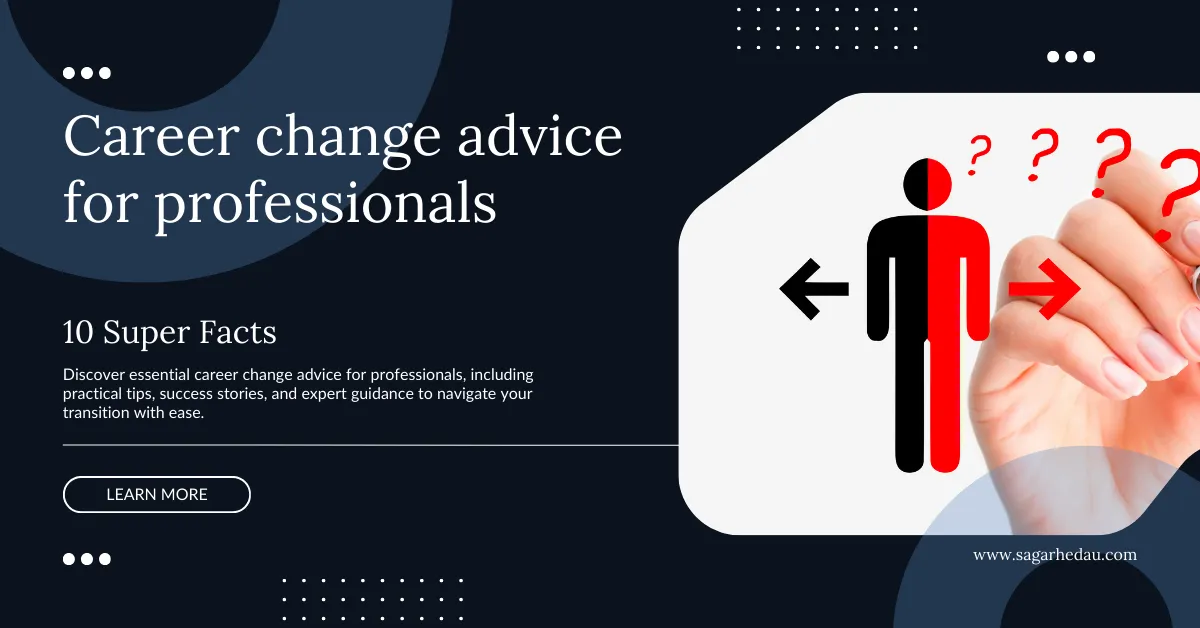Stuck in a job that’s sucking the life out of you?
Dreaming of a career that lights you up?
I’ve been there. Let me tell you, changing careers isn’t a walk in the park.
But it’s not impossible either.
People from one qualification are working in a totally different field which is not related to their academics. So, yes it is possible to switch. But, it will take time. My career change advice for professionals is to keep your time in hand and work rigorously to build your career from scratch again.
Career Change Advice for Professionals: The Real Talk
Thinking about a career change? You’re not alone. Many professionals feel stuck or unfulfilled in their current roles, and a change of direction can be incredibly rewarding. But where do you even begin?
Some random questions are bound to pop up in your mind when you plan to switch careers or move to entrepreneurship. My transparent career change advice for professionals is to confirm what you wish to do. Along the way, you will face the following dilemmas:
“Am I crazy for wanting to ditch my steady job?”
“What if I’m too old to start over?”
“How can I afford to make a change?”
“What if I fail and end up worse off?”
Sound familiar? You’re not alone.
I’ve been there. Stuck in a job that paid the bills but killed my soul.
Dreaming of doing something that mattered, but scared to leap.
Let me tell you how I changed careers – and how you can too.
No BS. No fluff. Just real talk.
Career change advice for professionals: It is not easy, it will take time. You are going to be “A FRESHER”. So, don’t take it as a walk in the park. You will have to start from skill development, zero experience and everything that comes along with it.
Here are the real pointers on career change advice for professionals:
Know Your “Why”
- Why do you want to change?
- What’s missing in your current gig?
- What are you running towards, not just away from?
Get crystal clear on this. It’ll fuel you when things get tough.
Skill Check
- What are you good at?
- What do people come to you for help with?
- What skills can you take to any job?
Make a list. You’ve got more to offer than you think.
Explore Like a Boss
- Talk to people in jobs you’re curious about
- Shadow someone for a day
- Try stuff out on the side
Don’t just daydream. Get your hands dirty.
Learn the Ropes
- Take a course
- Watch YouTube tutorials
- Read books by experts
Knowledge is power. And it’s mostly free these days.
Network (Without Being Sleazy)
- Join industry groups
- Go to meetups
- Reach out to people on LinkedIn
It’s not what you know, it’s who you know. Cliché, but true.
Test the Waters
- Volunteer in your new field
- Start a side hustle
- Take on projects at work that align with your new direction
Get experience without burning bridges.
Money Matters
- Save up before you leap
- Know your bare minimum salary needs
- Be ready for a pay cut (it might be temporary)
Don’t let finances derail your dreams.
Tell Your Story
- Update your CV to highlight transferable skills
- Craft a killer LinkedIn summary
- Practice your “Why I’m changing careers” pitch
Sell your journey, not just your experience.
Stay Strong
- Expect setbacks
- Celebrate small wins
- Find a support squad
This isn’t a sprint. It’s a marathon.
Let’s get some details on the above pointers related to career change advice for professionals:
Assess Your Skills and Interests
Before diving into a new field, take stock of your transferable skills and passions. What aspects of your current job do you enjoy most? Which of your strengths could be valuable in other industries? Understanding your core competencies and interests will help guide your search for a new career path.
Everyone cannot be suitable for the same domain or same job. Your take is to question yourself and get an answer to “What am I good at? What do I love?“. Once, you have it, you have your next career or business path lined up for you.
Brainstorm new career options
Feeling lost in the career jungle? Don’t worry, you’re not alone! Instead of feeling overwhelmed, turn your job search into an exciting adventure. Brainstorm dream jobs using a mind map, tap into your network for insider tips, and consider career counselling to unlock your strengths. Finally, use resources like Indeed to shortlist interesting options. This exploration phase will be like pre-mapping your career path, saving you time and leading you to your perfect fit!pen_sparktunesharemore_vert
Upskill and Reskill
Many career changes require acquiring new knowledge or certifications. Look into courses, workshops, or part-time study programmes that can help bridge any skill gaps. Online learning platforms offer flexible options for busy professionals.
A mechanical engineer willing to switch to IT will need to skill up in domains like digital marketing, data science, full stack development, UI/UX etc. Get knowledge on these and analyze what suits you best.
Network Strategically
Leverage your existing professional network and expand it to include contacts in your target industry. Attend industry events, join relevant professional associations, and engage on LinkedIn to build connections that could lead to opportunities.
Explore new circles and attend the most relevant conferences and events to get in touch with business owners or service personnel. They will be of great help to explore the field and make new connections in the long run.
Consider a Gradual Transition
A complete career overhaul isn’t always necessary or practical. Look for ways to incorporate elements of your desired career into your current role, or explore part-time or freelance opportunities in your new field whilst maintaining your current job.
It is not gonna happen in a day, a month or a year. It will take time. If you switched at 25, you will have to wait till 29-30 to reach the previous experience level in your new field.
Seek Professional Guidance
Career counsellors or mentors can provide valuable insights and support during your transition. They can help you refine your goals, develop a transition strategy, and navigate challenges along the way.
They know the various intricacies of any profile. Their experience in their own life and professional circle will give you a general idea of the market and the opportunities.
Prepare for Financial Implications
Career changes often come with financial adjustments. Create a budget that accounts for potential changes in income, additional education costs, or a period of unemployment during your transition.
the learning phase and the experience-building phase will be like a college pass-out candidate looking for a new fresh opportunity. Don’t get disheartened. Remember, you are starting from scratch as a fresher. You chose this.
You need to rebrand yourself
Forget the resume shuffle, it’s time for a career makeover! Before diving into applications, consider how you present yourself to potential employers. Think of your resume, cover letter, and online profiles (including Indeed) as your personal branding toolkit. This is especially crucial during a career change, where your past might not scream “perfect fit” for your dream role.
The key? Reframe your experiences! Highlight how your existing skills translate beautifully to the new position you desire. Craft a compelling personal statement across your resume, cover letter, and professional networks. This statement should be a powerful declaration of why you’re the ideal candidate. Don’t forget to extend your rebranding efforts to business cards, personal websites, and contact information – everything should reflect your new, career-ready you!
Be Patient and Persistent
Career changes take time and effort. Stay focused on your goals, be open to opportunities, and don’t be discouraged by setbacks. Remember that many successful professionals have navigated career changes and emerged stronger for it.
Conclusion
Remember, a career change is a journey of professional growth and self-discovery. By approaching the transition thoughtfully and strategically, you can find a new path that aligns with your skills, values, and aspirations. Whether you’re looking to switch industries entirely or pivot within your current field, the key is to stay open to opportunities and committed to your personal and professional development.
FAQs: Career change advice for professionals
-
How long does a career change typically take?
The duration of a career change can vary greatly depending on factors such as the field you’re entering, your existing skills, and the amount of retraining required. It’s not uncommon for the process to take several months to a year or more.
-
Is it too late to change careers in my 40s or 50s?
It’s never too late to pursue a fulfilling career. Many professionals successfully change careers later in life, bringing valuable experience and maturity to their new roles.
-
Should I take a pay cut for a career I’m passionate about?
This is a personal decision that depends on your financial situation and long-term goals. Consider the potential for future growth and job satisfaction when weighing the pros and cons.
-
How can I explain my career change to potential employers?
Focus on the transferable skills you bring and your passion for the new field. Craft a narrative that shows how your diverse experience is an asset.
-
What if I’m not sure what career I want to pursue?
Career aptitude tests, counselling, and exploring various industries through informational interviews can help you identify potential paths that align with your skills and interests.



